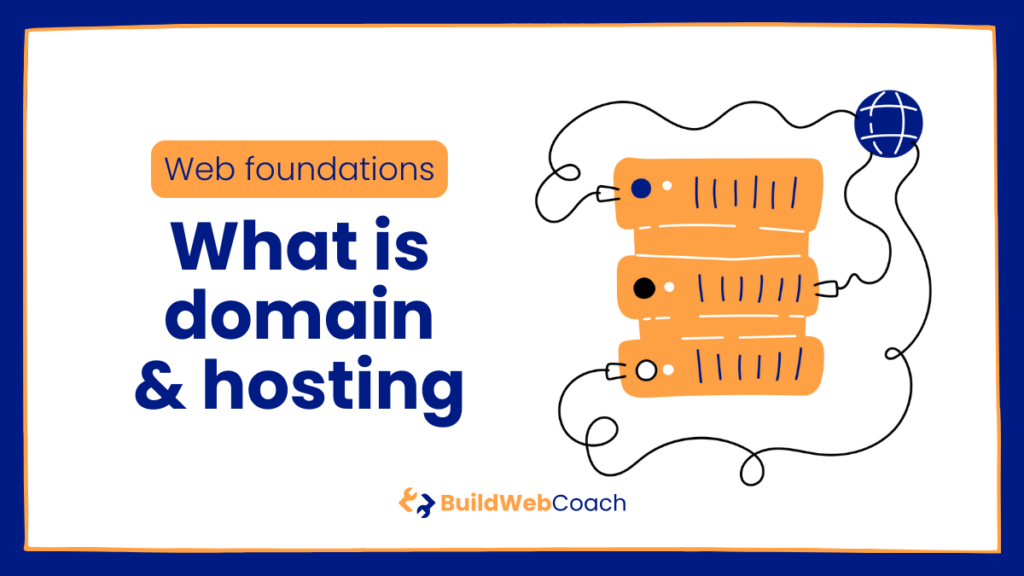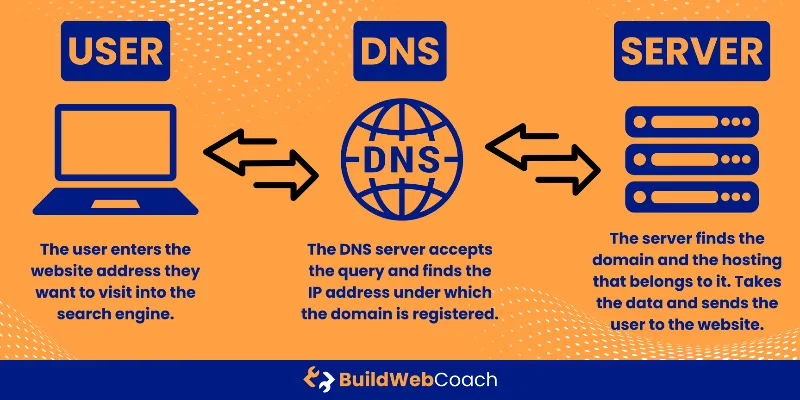Last Updated on July 19, 2024
If you are building your online project, you surely know that it is not easy. It is a relatively long and sometimes difficult journey, but in the end, you will receive a well-deserved reward that is worth it. In the course of it, you have to go through various milestones related to making websites. One of them is knowledge of domains and hosting. We will discuss them in the following article and provide you with as much information as possible so that you can understand them in detail. Simply put, a domain is the address of your website; it’s how users find you on the internet. Imagine a situation where a friend gives you an address so you can visit him. The same applies when people want to visit your website – they need an address. When you register a domain, you’re purchasing the right to use that specific address for some time, ensuring nobody else can claim it.
On the other hand, web hosting is where your website’s content lives. You can think of web hosting as an imaginary storage box (it is officially called a server) for the content of your website. It is connected to the Internet, and its content can be viewed by people worldwide who have your website address. So, thanks to web hosting, visitors can easily view the website’s content. Web content includes but is not limited to website files, including HTML documents, images, videos, and more.
Help with choosing a suitable domain and hosting is usually the first thing we solve with our clients. It is the imaginary cornerstone of every online project, from which everything else develops.

What is Domain and Hosting:
Key Takeaways
- A domain is your website’s address on the internet, unique to your site.
- Hosting is the service that houses your website’s files and makes it accessible online.
- Both domain and hosting are critical for creating and maintaining an online presence.
Understanding Domains
Domains are a crucial aspect of your online presence, acting as your website’s address on the internet. It is imperative to grasp the basics of domain names, understand the registration process, and become familiar with different types of Top-Level Domains (TLDs) to establish your brand and reach your target audience effectively.
Domain Name Basics
A domain name is your digital identity—think of it as the equivalent of your physical home’s address but on the internet. It’s a unique string of characters that directs users to your website. The versatility of a domain allows you to personalize your branding and ensure your audience can find you easily. Consider using a domain name generator to spur catchy and relevant ideas to your brand’s image and language when picking a domain name. Each domain name has two main parts: the name itself and the TLD (Top-Level Domain), also known as the extension.
Domain Registration Process
To acquire a domain name, you must go through the domain registration process with a domain registrar such as Hostinger or Domain.com. During registration, you will choose a domain name and one of the available TLDs. You’ll check the availability of your desired domain via a checker tool. If the domain is available, you can proceed to register it. The registration period can vary, but you can secure multiple-year ownership. It’s essential to consider adding domain privacy protection to keep your personal information out of the publicly accessible WHOIS database, safeguarding you from unsolicited contact.

Top-Level Domains (TLDs)
TLDs are the suffixes at the end of domain names, such as .com, .org, and .net. Several categories of TLDs include gTLDs (generic Top-Level Domains) and ccTLDs (country code Top-Level Domains). While gTLDs are more generic and can be used for various purposes, ccTLDs are typically specific to a country or region, like .uk or .ca. The oversight of these TLDs falls to the Internet Corporation for Assigned Names and Numbers (ICANN), the governing body responsible for coordinating global domain systems. When choosing a TLD, consider your brand’s focus—some TLDs can help define your site’s purpose. In contrast, others can cater to a specific geographic audience.
Exploring Web Hosting
Web hosting is an indispensable service for you as a website owner. It is unsurprising because it is a repository of all data related to your online project, i.e., the website. This is why people are so concerned with reading web hosting provider reviews to ensure they transfer their website data to a quality provider whose services are running smoothly. Therefore, you must thoroughly understand how web hosting works and its associated services.

Types of Web Hosting Services
Several web hosting services cater to various needs, ranging from personal blogs to large-scale enterprise websites:
- Shared Hosting: Ideal for beginners and small websites, shared hosting involves your website residing on a hosting server alongside other sites, sharing resources like RAM and bandwidth.
- VPS Hosting: A Virtual Private Server (VPS) gives you more control and dedicated resources. It’s a step up from shared hosting regarding power and customization.
- Dedicated Hosting: With this service, you get an entire server dedicated to your website, providing maximum control, performance, and security.
- WordPress Hosting: Tailored specifically for WordPress sites, this hosting offers features like one-click installs and enhanced security.
- Cloud Hosting: This hosting provides scalability and reliability by distributing your data across multiple web servers.
Key Hosting Features
Your chosen web hosting service should come with a set of critical features that will help you manage and grow your online presence effectively:
- Uptime: The reliability of a hosting server is measured by its uptime, typically listed as a percentage. Look for a service with 99.9% uptime or higher.
- Bandwidth and Storage: Assess your site’s data needs and choose a plan offering sufficient bandwidth and storage to handle your traffic and files.
- Free Domain: Some hosting plans include a free domain name for the first year.
- Email Addresses: Professional email addresses tied to your domain are often provided.
- Management Tools: Use user-friendly tools for handling hosting settings and name servers.
- Customer Support: Reliable, 24/7 customer support is crucial for immediate help with any issues.
How Hosting Affects Site Performance
Web hosting has a direct impact on your website’s performance:
- Speed: Your site’s load times are affected by the type of hosting, resources allocated to your plan, and the hardware quality.
- RAM and Processor: Adequate RAM and a high-quality processor ensure swift data processing and site responsiveness.
- Scalability: As your site grows, your web hosting service should quickly scale up resources to maintain performance.
By considering the hosting services available and key features aligned with your needs, you can choose a web hosting plan that helps you build a strong, reliable online presence.
How Domains and Hosting Work Together
Understanding how domain and hosting relate to each other and how they work together is fundamental to successfully starting your online project. They’re the fundamental components that make your website accessible to users worldwide.
Linking Domain and Hosting
When you register a domain, you acquire the address people use to find you online – your URL. Hosting is where your site files are stored, analogous to renting space on a server. To link your domain to your hosting, you must access your hosting provider’s control panel and update the name servers to those provided by your domain registrar. This ensures that when someone types your domain into their browser, they are directed to the correct server where your site files are hosted.
The Role of DNS
The Domain Name System, or DNS, acts as the internet’s phonebook. It translates the human-friendly domain names into IP addresses that computers use to communicate.
The process usually involves the user entering a web address into the browser – for example, buildwebcoach.com. The DNS server accepts the query and finds the IP address under which the domain is registered – for example, buildwebcoach.com = 154.41.250.150. If there is any hosting under the specified domain, the server will take data from it and send it to you, and at that moment, you will be on the desired website.

If you purchase a new domain, you must set up DNS records. You do this at the provider who manages your DNS servers. Once you’ve set your domain’s name servers, the DNS records are updated to point to your hosting server’s IP address. DNS changes can take 24-48 hours to propagate, which is essential for user experience and SEO considerations.
Website Accessibility & Control
After the domain and hosting are linked and DNS settings have propagated, your website becomes accessible to the public. Your control panel allows for managing various functionalities, from installing an SSL certificate for secure connections to creating custom email addresses using your domain. It’s also your go-to place for tools such as a website builder, technical support, and authentication processes. Proper setup and management through the control panel enable complete control of your web presence and optimization for the best user experience.
Enhancing Your Website’s Technical Aspects
When aiming to boost your website’s technical prowess, it’s essential to make strategic choices about hosting, ensure robust security, and gear up for sustained growth and high performance.
Choosing the Right Hosting Plan
Your website’s success hinges on the hosting plan you select. It needs to align with your business’s needs and the volume of resources required to run efficiently. WordPress hosting is popular due to its simplicity and compatibility with one of the most widely used website builders. It’s important to differentiate between shared, VPS, dedicated, and cloud hosting. We wrote about this above. Factors in the pricing include the availability of customer support and specific features when deciding. Remember, like renting property, this is where your website’s files and data will reside.
- Shared Hosting: Economical, suitable for small websites with moderate traffic.
- VPS Hosting: Offers more power and flexibility; considered a middle ground.
- Dedicated Hosting: Best for large businesses needing maximum resources and control.
- Cloud Hosting: Provides scalability for growth and spikes in traffic.
Securing Your Domain and Website
Security is essential for protecting your website and maintaining credibility. Purchasing SSL certificates is crucial; they safeguard data exchange and boost your site’s trustworthiness. Regularly updating these certificates to prevent lapses in protection, known as renewal, is vital. In addition, it’s beneficial to register your domain with a reputable service, one that ensures branding consistency and long-term availability.
Security Checklist:
- Ensure SSL certificates are active and updated – do not forget that Google considers the presence of an SSL certificate as one of the primary signs of credibility.
- Choose a domain service that offers good support and reliable renewal reminders.
- Implement security measures for your hosting environment.
Optimizing for Growth & Performance
To optimize your website for growth and performance, you must consider the infrastructure that can handle increased traffic without compromising speed. Employ performance monitoring tools to detect any resource constraints early on. Considering scalable options like cloud hosting could be a wise move to manage growth.
Optimization Tips:
- Use caching to decrease load times.
- Optimize images and files for faster page loading.
- Regularly update your content management system and plugins for speed and security.
By making informed decisions about your hosting plan, securing your domain, and optimizing for future growth and performance, your website will be well-positioned to evolve alongside your business. Choose options that offer the best mixture of features, support, and scalability to maintain your site’s effectiveness and reputation.
Building and Managing Your Online Brand
Your online brand is your digital fingerprint; it sets you apart in the virtual world. Building a brand that resonates with your audience and stands the test of time requires a solid foundation, starting with your domain and hosting.
Developing a Strong Domain Strategy
Choosing the right domain name is crucial for effective branding and SEO. A name that closely aligns with your brand improves recall and credibility. You should not forget the general rules for choosing a suitable domain name.

Opt for a TLD recognized and trusted by users to strengthen your brand’s professional image. Consider domain privacy to protect your personal information, and select domain names with potential keywords relevant to your business to boost your SEO efforts. Ensure your desired email addresses are consistent with your domain to maintain a professional appearance across communications.
Leveraging Hosting for Business Growth
Your choice of a hosting provider can significantly influence your website’s growth and scalability. Look for a host that guarantees high uptime, ensures visitors have access when needed, and enhances your brand’s reliability and credibility. As your audience grows, your hosting plan should be able to scale with you, handling increased traffic without a hitch. Evaluate hosting providers that offer business-focused features such as dedicated support, enhanced security, and performance analytics.
Ensuring Consistent and Reliable User Experience
A flawless user experience (UX) keeps your audience coming back. Fast loading times and straightforward navigation lead to higher traffic and positive reviews, directly affecting your credibility. Regularly audit your site’s performance across different devices to guarantee a responsive UX. Monitor visitor analytics to understand their behavior and use this data to make informed updates that streamline their experience on your website. Your website’s dependability, mirrored through consistent uptime and scalability, reassures your audience of your brand’s stability.
By focusing on these strategic areas, your online brand will attract and retain a loyal customer base.
